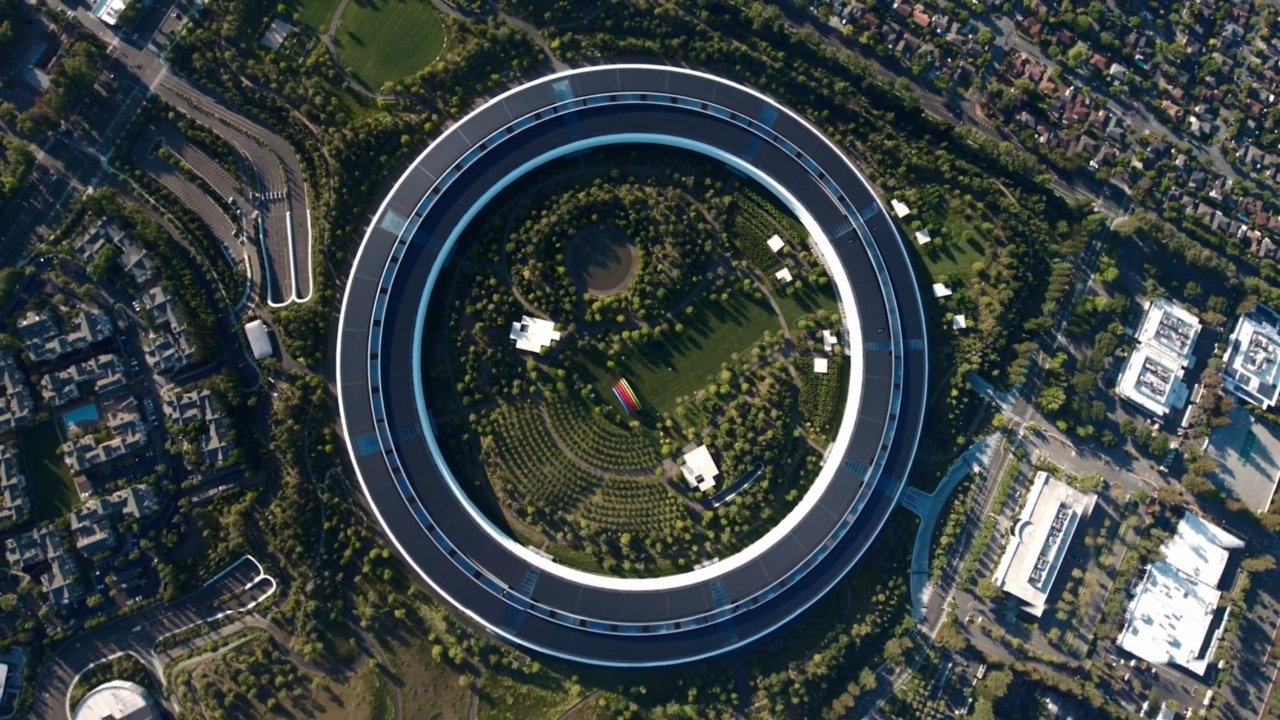An Apple employee is suing the company, claiming that it forces staff to give up personal privacy, and demands that it be allowed to use surveillance even when they are at home.

Apple Park seen from above
Earlier in 2024, a former Apple software engineer made increasingly paranoid claims about the company, and ultimately threatened the FBI if they didn't investigate. According to New York-based Semafor, a current Apple employee is making similar claims about Apple surveillance, and doing so in a lawsuit.
Amar Bhakta works in advertising technology at Apple and according to his LinkedIn page, has done so since August 2020. However, that LinkedIn page is part of Bhatka's suit as he alleges that Apple forced him to remove information about his job from it.
"For Apple employees, the Apple ecosystem is not a walled garden," says the lawsuit brought by Chris Baker of Baker Dolinko & Schwartz, and Jahan Sagafi, of Outten & Golden. "It is a prison yard. A panopticon where employees, both on and off duty, are subject to Apple's all-seeing eye."
Apple reportedly forbade Bhakta from speaking at public events about his digital advertising field. Staff are said to also be required to use only Apple devices while at work, and are in some unspecified way encouraged to use their personal devices.
Once they do use a personal device and personal iCloud account as part of their work, Apple allegedly requires them to agree to the company monitoring everything.
"If you use your personal account on an Apple-managed or Apple-owned iPhone, iPad or computer, any data stored on the device (including emails, photos, video, notes and more), are subject to search by Apple," the lawsuit claims Apple's policies state.
Apple denies all of the claims in the suit. "Every employee has the right to discuss their wages, hours and working conditions," it said in a statement, "and this is part of our business conduct policy, which all employees are trained on annually."
What happens next
The suit has been filed under the California Private Attorneys General Act. While it has been filed on behalf of Bhakta, if Apple is found to be liable, it could be forced to pay penalties to him and to every employee believed to be affected.
However, based on the details reported so far, the chances of Bhakta winning the case are as low as those of him keeping his job at Apple. While there may be elements in the full suit that have yet to be made public, everything listed so far is common practice -- even if it sounds draconian.
Apple refusing to allow Bhakta to take public speaking engagements related to his field, for instance, would frustrate any staff. And it is true that people joining Apple have given up outside work or, for instance, websites.
But anything Bhakta said would have be taken to be Apple's position. So it's understandable and predicatable that he be not allowed to effectively represent the firm.
Apple is not spying on its staff
The key part of the surveillance claim is that the quote policy explicitly refers to "an Apple-managed or Apple-owned" device. No corporation allows unknown devices onto its networks where privileged information is held.
Having your device on a Mobile Device Management system does not mean that Apple is spying on its staff's every move. Bhakta's lawyers could conceivably take the stance that Apple is preaching privacy while denying it to its own staff, but that would be playing to the court of public opinion instead of using the facts.
As for Apple forcing Bhakta to remove details from his LinkedIn page, it's not clear whether that means his profile or his conversations on the service.
Bhakta is unusually vocal on LinkedIn for an Apple employee, and his profile bio is more detailed than is typical. If he didn't inadvertently reveal company secrets on the service, it will be simple for Apple to claim that he did.
Separately, an internal report in 2022 said that Apple does not stifle employee speech. It claimed that instead, Apple exceeds what the law requires for free speech.
